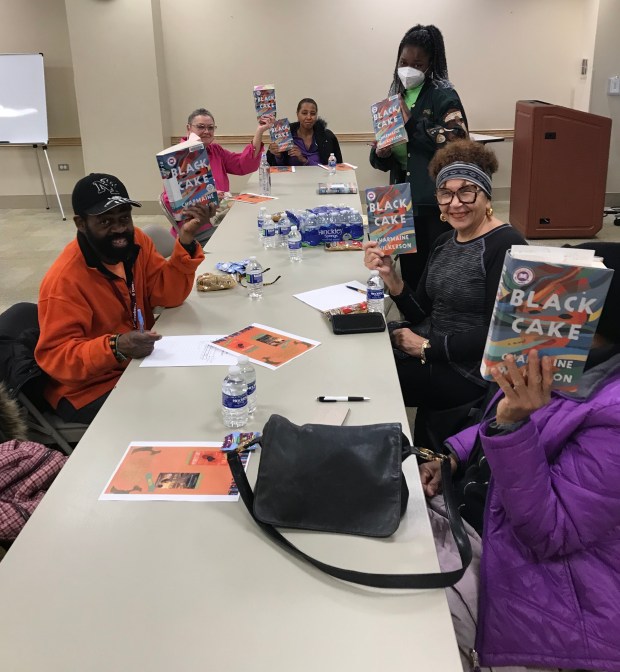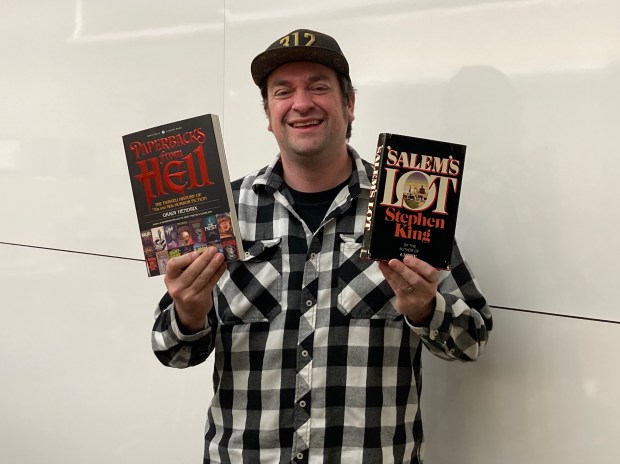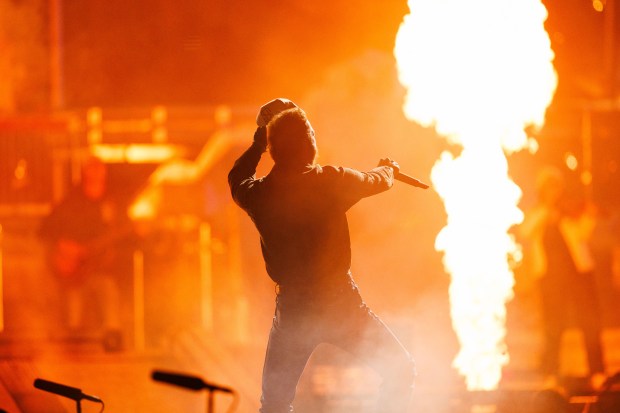Palos Heights resident Phil Kuchinsky used to peek in on his wife’s book club meetings, but even though he’s an avid reader, he was looking for something different.
“This looks like fun,” he said, “but I want to talk about gross stuff. I wanted to do this but about murder and spooky stuff.”
Kuchinsky initially thought he’d have to travel to bookstores in Chicago but was daunted by the long drive. “I thought ‘I can’t be the only one in the burbs who was reading Stephen King.’ …. There are other dads and moms who would like to talk about it,” he said.
Enter Matt Matkowski, head of public services at the Palos Heights Public Library, which used to host a science fiction book club prior to the pandemic. “When I pitched this idea, Matt was very supportive,” Kuchinsky said.
The result was a horror book club, which began in October 2023. It draws a small but growing group of enthusiasts who meet from 7 to 8 p.m. the second Wednesday each month at the Palos Heights library.
Kuchinsky said the club has room to grow.
“I know there are other weirdos out there that read this stuff like us,” he said. “I know there are other people who want to read spooky stuff.”
The club has discussed books made into movies, such as King’s ‘Pet Sematary,” and Kuchinsky would love to delve into classic horror works. March’s selection is the novella “The Salt Grows Heavy” by Cassandra Khaw. They also discuss genre links to everyday life. Club member Michelle Plunkett works in a funeral home, which prompted some joking at a recent meeting.
“Honestly, from a more literary point of view, horror is the genre that we use to unpack all the crazy world around us. It always turns a mirror back on society itself. In the ‘70s, some of the biggest selling books were where you had some kind of haunted house – Amityville Horror was one – and the whole reason that happened was the economic recessions,” Kuchinsky said.
“People’s mortgages were killing them, so horror kind of turns their eye back on them,” he added, “dealing with it through a lens that doesn’t make it so obvious. If you look even further to the horror of the ‘80s and ‘90s and especially now, you start getting all these themes of queer horror and LGBTQ+ horror is having a moment. I love that because it’s a way to sort through all of those really heavy topics.”
The library supports the club by publicizing its meetings and making sure copies of the next month’s book are available, thanks to interlibrary loan. “As we leave, we all check out,” Kuchinsky said. “We do a little game and the person who has the book from farthest away wins.”
He wants to abolish thinking that reading is an elitist pastime.
“I love reading trash and filth. It doesn’t have to be a super highbrow experience,” he said. “I don’t ever anticipate it would be a 50-person book club, but I think there are 15 or 20 people who want to read horror.”
At another area book club, attendance varies depending on what the group is reading.
The African American Book Club at the Matteson Area Public Library averages about seven participants at its meetings from 6 to 7:30 the fourth Wednesday each month.
“If the book is really popular, it’s closer to 15,” said Jihan Davis, who began leading the club in May. It started in 2007 but membership “fell off for a little bit,” she said, before restarting in 2022.
The library wanted to offer a book club in the evening because morning groups were limited to people who don’t work or who are retired.
“We also wanted a book club that reflected people in our community and stuff they might be interested in reading,” Davis said.
Most members read the entire book, but it’s not a requirement. “We’re a no-pressure type of club. I tell people to still come in because there’s a lot you can contribute,” she explained.
The club focuses on Black authors. “We get authors from all around,” Jihan said, adding that she’s the one who typically chooses the books. “Personally, I really love Caribbean literature, so we read a lot of that. Also African authors.”
Monthly themes help determine the choices. March’s selection is “Sula” by Toni Morrison “because it deals with friendship between women,” she said.
“I think one of the interesting things about our book club is that because the basis is books by Black authors, that gives us so much freedom in the stuff we read. Someone said ‘I want to read this book, a young adult novel, because I’m just starting to read.’ We’ve had graphic novels,” Davis said. “We can introduce people to different mediums and all the ways that Black authors have contributed to so many genres …. I think that’s what makes book club in so many different ways, even if we have a topic to stick to.”
Running the club is not a one-woman job. “I receive a lot of help from other people. Marketing makes material to go online and up front. We all kind of collaborate. We always have snacks at the book club, so we do stuff like that too,” she said. “We get extra copies. We have them sent to our library. We try to make it easy for people to get the books in hand.”
All people welcome, although advance registration is helpful so the library procures enough books and has enough snacks. “I’ve had people come from Chicago Heights,” Davis said. “Anybody can come.”

Snacks and books also go hand-in-hand at the Frankfort Public Library’s Coffee Cake & Crime Book Club, which meets at 9:30 a.m. the first Monday of each month. It was started in 2007 by Mary Koch, adult services librarian, who loved mystery books and wanted to try a new discussion group based on that genre.
After experimenting with different times and dates, Friday morning was determined to be a “hit,” with eight to 12 people consistently attending, and now even more participate, according to adult services librarian Rebecca Cerf, who leads the club in the wake of Koch’s retirement in 2018.
“Mary wanted to offer coffee and a sweet treat, so we brainstormed some ideas, and Coffee Cake & Crime sounded perfect as it brought together a bit of coziness to a genre that is not always cozy. We now only provide the coffee cake as most people bring in their own favorite morning beverage.”
Although adult service librarians typically pick the titles, surveys are sometimes sent to core participants to determine interest in specific titles.
“Generally, we like to provide a variety of crime stories, anywhere from cozy mystery to suspense thriller to police procedural, etc.,” Cerf explained. “A variety of authors is a must, typically not blockbuster authors. We also include stories of human-interest, and settings in other parts of the world to expose our readers to real life conditions and situations.”
She said some of the best discussions “have been stories that people identify with. Even when participants may not have entirely enjoyed the book or story, the subject matter or topic created a dynamic group discussion,” such as “City of Veils” by Zoe Ferraris or “Winter Counts” by David Weiden.
Cerf said groups such as Coffee Cake & Crime offer something that solitary reading doesn’t — a way to forge connections.
“Book discussion groups provide a neutral or safe space for people with a shared interest to engage in dialogue with people that they don’t already know. Often, participants have conflicting opinions about the stories and subjects that are being told in these books, and the book discussion leader can help navigate through some of these difficult topics. Discussion groups are also a way to meet new people in our community.”
Melinda Moore is a freelance reporter for the Daily Southtown.




